Memoirs of an Occasional Witcher
A really good game can take you down a winding path when you’re lost and you want to be.
It’s three forty-five AM, and, knowing I have nowhere to go in the morning and no one to greet me when I wake, I’m sailing through the Skellige Islands, the dim light from my handheld Nintendo Switch diffusing over my haggard and unseen face. Skellige is the second of several immersive maps in Warsaw-based CD Projekt Red’s magisterial 2015 game The Witcher 3: Wild Hunt, a series so prized in its home country that back in 2011 Poland’s prime minister gifted a copy of the second game, Witcher 2: Assassins of Kings, to Barack Obama.
The Witcher 3 has been lauded with honors by the score, including garnering Game of the Year from three separate awarding bodies. It’s based on a series of novels by the Polish fantasist Andrzej Sapkowski, and adds a welcome Eastern European influence — in the nature of its monsters and its men — to the sword-and-sorcery tropes of high fantasy. It has sex and blood without as much gratuitous cruelty as George R.R. Martin’s work, and a dense network of relationships to navigate as the game’s stoic white-haired protagonist, the mutant professional monster-slayer Geralt of Rivia. There’s a Netflix series now, with the impossibly handsome Henry Cavill as Geralt, but I haven’t made it much past the pilot — I’m too accustomed to the games, which are better written, and the novels, likewise — although I may return to it before the second season premieres. Besides, I prefer controlling a grittier Geralt and his morally questionable decisions to passively watching Cavill swan around in pleather-looking muscle armor. I have spent a lot of time as Geralt of Rivia. There have been days when I’ve spent more time inhabiting him than myself, and been grateful to lose my body. I have played two hundred and thirty-six hours of this game over the last month. And fourteen minutes.
Six years after its release, The Witcher 3: Wild Hunt holds up marvelously — so driven by a complex story that any technical glitches, or the protagonist’s maddening habit of dispatching archgriffins and giant spiders with ease only to die horribly by falling off a four-foot ledge, pass as minor inconveniences. It holds up, and it takes a hold on you if you’re susceptible to this sort of thing, if you’re ready to lie in the dark, sailing between the interminable rocky juts of this fictional, Celtic Scandinavia. In the serge-blue CGI sea, usually in the rain, thousands of feet apart, there are smuggler’s caches — chests affixed to floating barrels, to which one sails, dives, loots, dispatching underwater monsters with a crossbow. Rinse the blood and seawater off, repeat. On the Skellige Islands, there are 278 points of interest to discover, mostly those damn barrels, a few sunken ships, little bits of grimy treasure scattered in a vast ocean.
There are plenty of other locations — the dour, war-torn Velen, full of hanging corpses, desperate peasants, and nests of ghouls; the seedy city of Novigrad, with an astonishingly well-fleshed-out criminal underworld and a religious cult bent on burning witches and an elven swordsmith who sells dumplings; the fairy-tale beauty of Toussaint, a broad lampoon of chivalric France. Pillaging the Skellige oceans is the most tedious part of the game by far — a process known as “grinding,” engaging in dull or repetitive actions in order to level up one’s character, or attain loot — and it’s the mark of a dedicated obsessive to engage in this repetitive action, driven by an urge for completionism or in-game mammon or both. And it’s four o’clock in the morning now, four thirty, and I’m still sailing, with the screech of harpies my only company.
You can get lost in a story. Lost in a game. Lost in a sea. Lost in yourself.
I’ve never been particularly good at being alone for extended periods of time — I grew up in a big family, lived with roommates in college. As a tempestuous teen I liked solitary rambles when my emotions or those of my household got to be too much for me; in college, when I was a different person, before I developed a panic disorder and accompanying agoraphobia, I had tremendous adventures to Iceland and Russia and Odessa — but all these were strictly delimited to weeks or months and featured many temporary companions.
My first protracted experience of solitude came in the year 2012, when I received a Fulbright grant that dispatched me to Kyiv, Ukraine, and I lived in a little furnished apartment over the Dnipro River from the city center. The apartment complex was incomprehensibly vast, the winter long; I had no schedule and only the vaguest of research projects; and I grew acquainted with the experience of not talking to another human being for 24, 48, 72 hours. On those endless snowy days — no sight of sun for weeks at a time — I learned to tramp through unsalted ice in my big rubber boots for the most basic of necessities, going to the café in the apartment complex for hours just to hear my own voice speaking to the waitress, ordering tea.
There were also real dangers outside my door, for a solitary 23-year-old woman whose Russian was not native and whose Ukrainian was worse: I got chased by strange jeering men through the frozen tunnel to the subway station where amputees, veterans of the Soviet campaigns in Afghanistan, sang war ballads for kopeks; while skittering out for supplies I accidentally bought a dented can of horse meat from the Belarusian market; I got beaten up by a cab driver on one of the rare occasions I did venture out; I was chased by a pack of feral street dogs through the woods near the Holocaust slaughter site of Babi Yar, and held them at bay only by screaming. One day in the dead of winter I walked out onto the frozen Dnipro and in my despair contemplated walking til the ice was too thin to hold me, and never returning to the bank; I was saved by bare-chested, drunk ice-fishermen who jolted me back into self-preservation with lewd remarks … (There were also castles in the snow, long journeys by train over the endless steppe, the impossible stark beauty of the Carpathian Mountains — but these reprieves were the exception, not the rule.)
It was a dark and pretty terrible winter, and I hibernated, turning all my functions as close to zero as possible to survive. Time seemed to go faster if I stayed up all night and slept all day; or perhaps I felt too monstrous for human company, adopting a kind of slobbish vampirism. And I developed a gaming habit. I didn’t have Internet in that accursed apartment filled with reeking jars of Marlboro butts and laundry that froze before it could dry on the line, even indoors. But there was a little PC game called “Faster than Light” I could play on my shitty laptop where you have to control a spaceship and keep it running while delivering some crucial information across the galaxy. It’s deceptively simple, without much of a story at all, but it’s numbingly hard, and I exploded in space repeatedly, unable to win the climactic battle or keep my ship together. I died in the stars, died and died all night. It was compulsive. It ate away the time and the fierce loneliness. I was accumulating scrap and drones, saving my fuel for warp jumps, I didn’t have to think. I died in the game so often that I didn’t have to die in real life.
The Sword and the Sandwich is a newsletter about deadly serious extremism and equally serious sandwiches. Please consider supporting this work with a paid subscription:
It’s been nine years since that winter — nearly a third of my life — but I still dread extended solitude, and have an attendant raft of phobias (sometimes I joke that I am a burlap sack of neuroses held together with duct tape, and it’s not really a joke, or even funny). A few weeks ago I had to face this big fear again for the first time since Kyiv: I would be entirely alone for three weeks, as the people I live with went away on a long trip. I do not have an office, or a schedule, and freelance writing is vague and open-ended — all the material was present for a period of survival hibernation, although this time there was no snow yet, and I had family and friends close at hand.
Nonetheless, driven by old habit and old compulsion, I returned to a nocturnal life — waking up, ashamed and disheveled, at 4:30pm some days. And I fired up The Witcher 3: Wild Hunt, drawn in by its legendary reputation. I played (and died). I got better and died less. I made potions and decoctions, romanced a sorceress and slept with prostitutes, killed feral Polish vampires, tricked spirits, fought tree monsters that could transform into flocks of crows and thrust out roots like spears. I drove necrophages off battlefields, changed the course of history for two separate realms, learned to play a card game, looted inns and wagons for dumplings and pork and junk to sell. I grew to adore a foppish poet and a stout dwarven adventurer and felt paternal feelings for an ashen-haired girl with a scar on her cheek. I got haircuts, acquired ever-more-elaborate armor, cast furiously powerful runes, spared the lives of sentient trolls and succubi. The thing about this game is that there is a real story — it has eight novels’ worth of lore to draw on, for one — and as ham-fisted and unsubtle as life lessons derived from RPGs can be, there’s some decent enough wisdom buried in its salty one-liners and grim battlefield landscapes. There’s magic (I love magic) and swords (I fucking love swords) and enough characters — a nobleman cursed by a deal-making demon, a vintner’s prim majordomo, several serial killers — to populate my loneliness.
A really good game can take you down a winding path when you’re lost and you want to be. A really good game can be a companion when you need one, for two hundred and thirty-six hours and fourteen minutes, or longer. Enough that you want to protract the journey — you don’t want it to end, and the solitude you feared so much becomes bearable, even desirable. Enough that you find yourself sailing through barren digital seas just to keep the story going a little longer, to uncover the very last mysteries of the map. When you shut down the console and blink at the real sunlight of a beautiful autumn, there’s a little jolt of grief, as at the close of any triumphal and absorbing story. But you’ve grown up, a little and a little, over the last decade. You don’t want to die, now, don’t want to walk into the river. You just want to walk along the bank, where the water glistens despite all the murk below. And you wonder, for a second, if there are any smugglers’ caches full of armor in the Hudson, any harpies or sirens keening off the piers. There aren’t any, of course. But for a second the world feels infused with magic — and a long-held fear has lost its grip — and the sun feels good on your long hair.





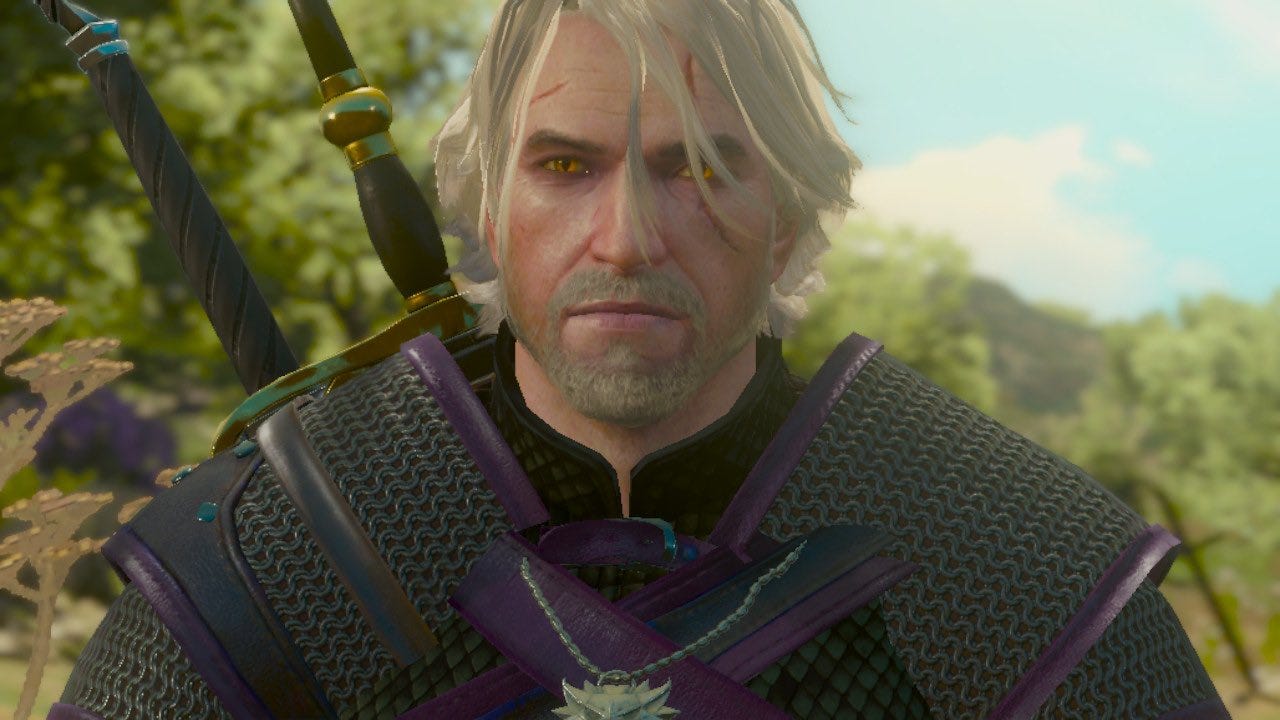
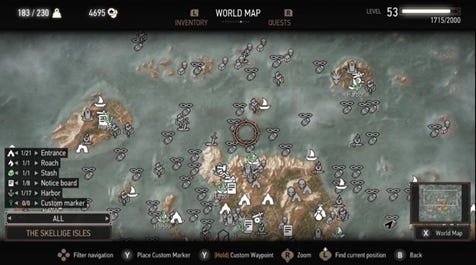
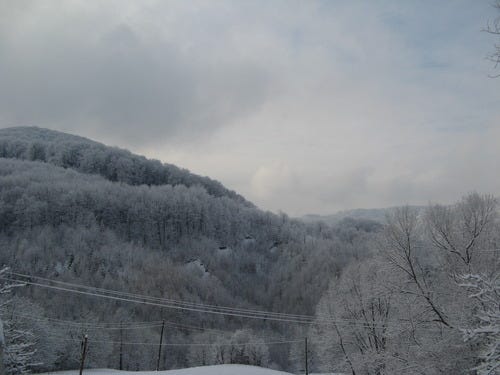
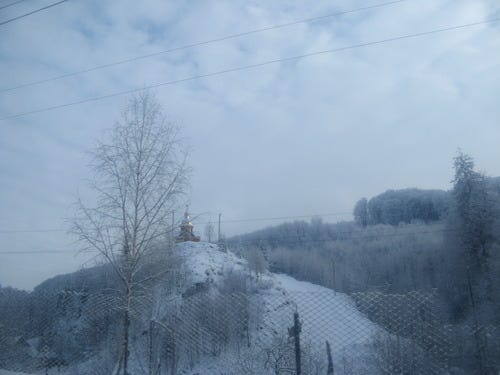

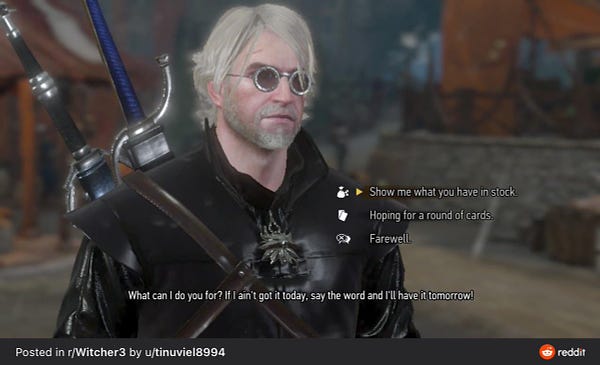

This perfectly describes my attachment and connection to video games. I'm doing something eerily similar right now with a game called Yakuza 0. No swords or sorcery (though I've spent my own time with Geralt) there's bustling Japanese life, and vending machines with fishing bait, and the intertwining stories of two young men desperate to discover who they are and find their own path in life. A wonderful article 💜
DragonAge is another good one